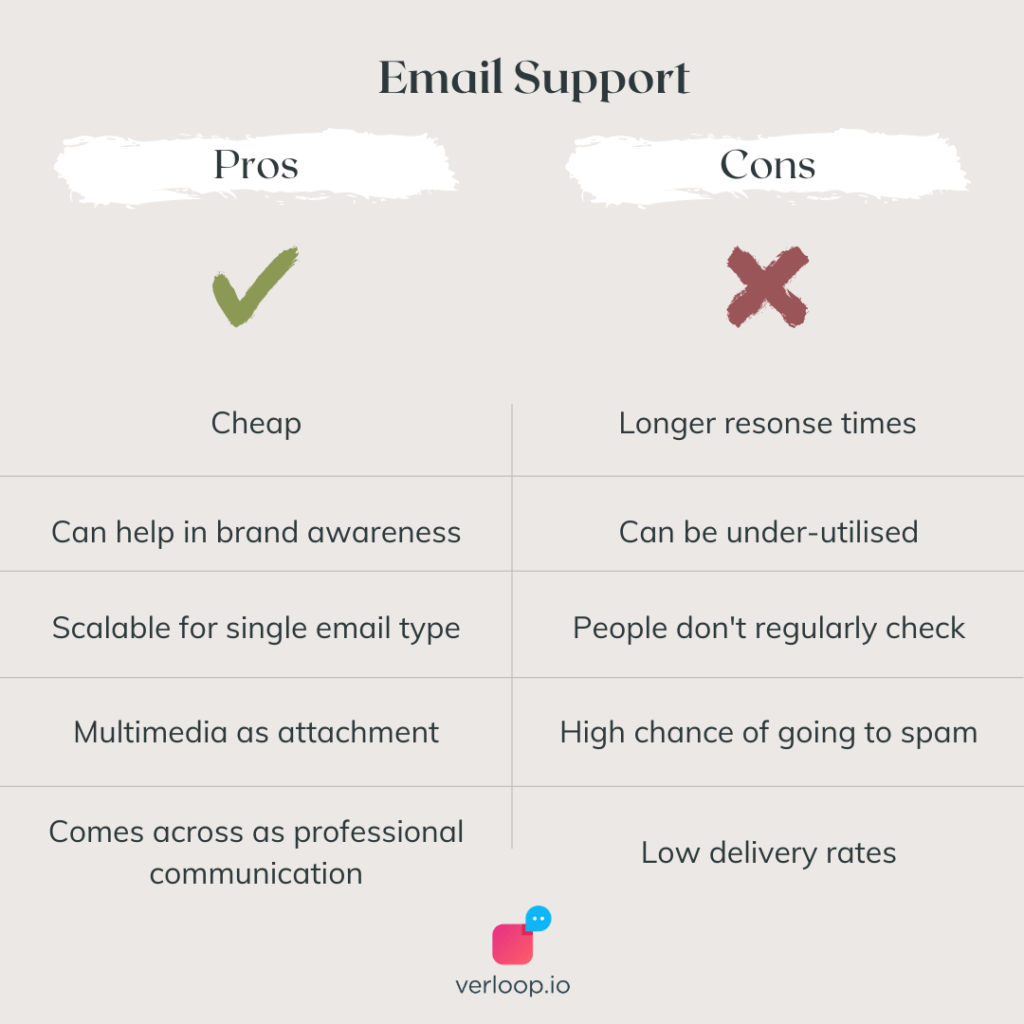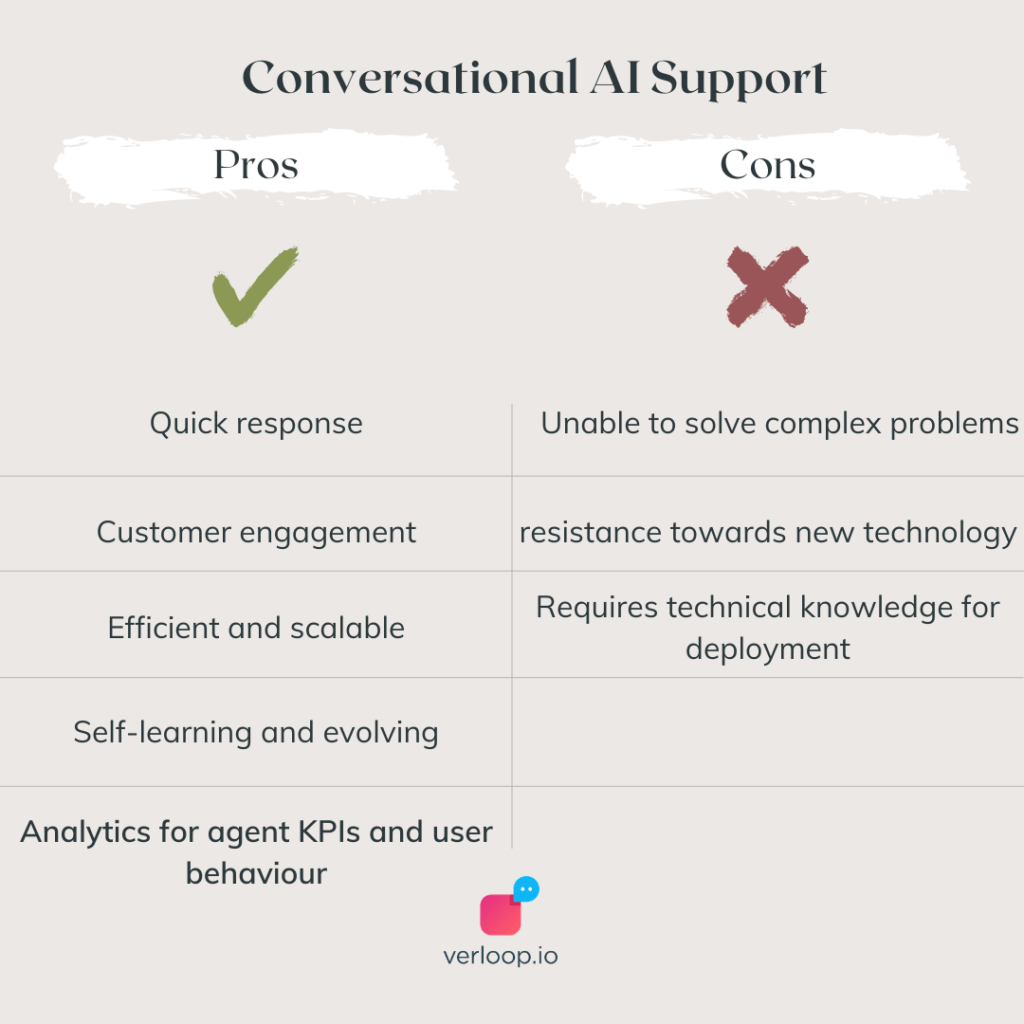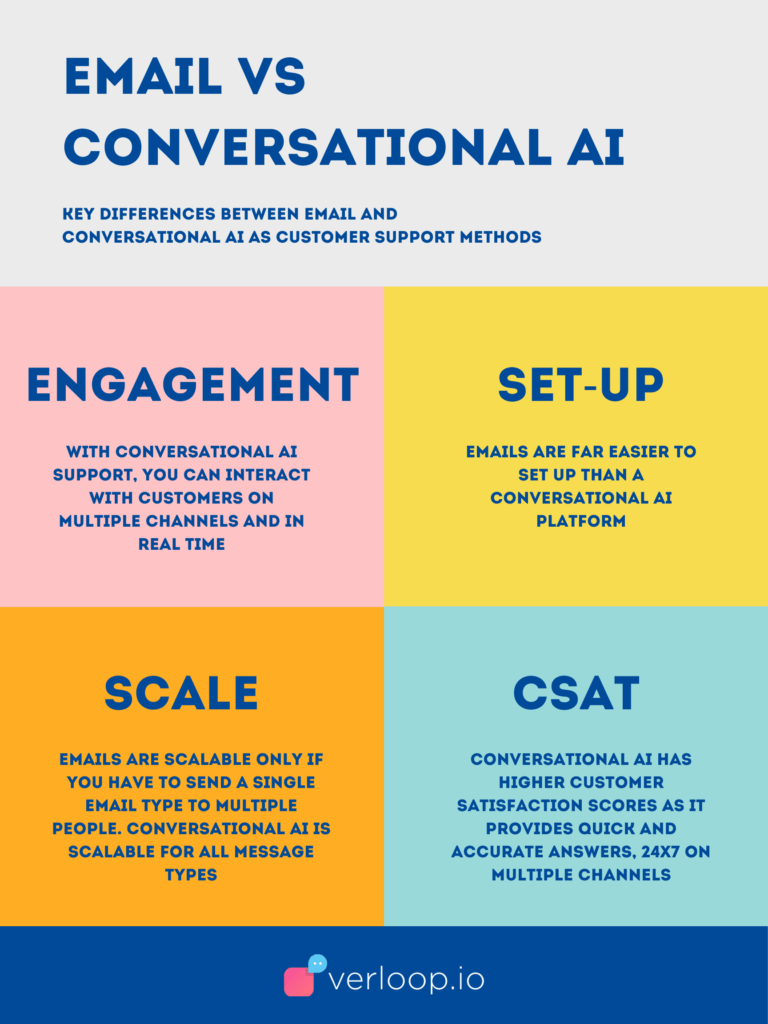Types of Customer Support: Email vs Conversational AI

Types of Customer Support: Email vs Conversational AI
Conversational AI is trending and preferred communication tool for businesses. We look at key differences that set apart conversational AI from email.
Email vs conversational AI — both are primarily text-based support methods. But the experience is as different as it can get. In this blog, we look at the pros and cons of both support methods, which will help you understand which is better for your company.
It was not long after the boom in the telecommunications industry that businesses felt the need to reach out to their customers.
This reach out was not just limited to selling products and services to customers. They wanted to provide their customers with avenues to register their grievances and seek help.
Phone support became one of the most popular of these customer services for obvious reasons. In text support, SMS and emails became more popular.
With time, SMS became less popular with the advent of messaging apps. Email support still stood its ground as a service used to raise issues with a service provider.
However, the popularity of emails today faces a serious challenge in the form of conversational AI chatbots that are taking the market by a sweep.
What is Email Support?
Email is a means of exchanging messages and documents through an email service provider. When such a service is used for providing customer support, it is termed email support.
Pros of Email Support
- Cheap: There are free email services available all around the world. You just need an internet connection to successfully send an email to someone.
- Brand awareness: Emails can be designed to create awareness among people about a brand. Today, email marketing is popular for this reason. You can design emails to include all the designs, logos, slogans, pictures, and colours to create an impression on the customer’s mind. It develops a great recall value for the brand. And all this can happen while businesses are catering to their customers’ problems and resolving them.
- Scalable: You can email as many people as you want in one go. In that sense, emails are a very scalable option for conversing with your customers.
- Flexible: In addition to text messages, you can share documents, images, and files in other formats. This makes emails both flexible and powerful.
- Professionalism: Even when the conversational AI vs email support debate favours the chatbots, emails remain the most professional way of communicating with anyone. That’s why even while they have deployed chatbots on your sites, businesses are still not letting go of their email support services.

Cons of Email Support
- Longer response times: If you have ever used an email to register an issue with an organization, you already know that emails do not always get a prompt response. Customers have to wait an eternity before things start to move. Thus, emails have scalability issues when a lot of different emails types have to be sent.
- Lack of connection: If there were ever a competition to reach out to someone in the most disconnected manner, a clear winner would be emails. Due to time-lapse, there is a disconnect between the customer and the agent and customers have to follow up. This results in a bad customer experience.
- Not very high acceptance: People don’t check their emails regularly. And from a company perspective, when there are too many emails, they get lost in the overload.
- Lost in spam: One can find a lot of spam mails in their inboxes these days. Sometimes, even important emails go to spam. Many times, a customer doesn’t get to see the email response from the company.
- Non-delivery: There can be issues with the email delivery due to wrong or inactive email IDs. Even if the inbox is full, the email doesn’t get delivered.
What is Conversational AI Support?
Conversational AI is an artificially intelligent platform that businesses deploy on their websites or as their messaging representatives to solve customer queries. These are gaining popularity due to their increasing functionalities with minimal human intervention.
Conversational AI platforms massively enhance user experience as they don’t have to wait to resolve their issues.
All sorts of industries like eCommerce, Health care, Online Travel Agencies (OTA), Real Estate, Banking, Logistics, Edtech, Insurance and Foodtech are using such bots for keeping their users happy and engaged.
Pros of Conversational AI
- Quick response: This is the first selling point of any conversational AI support. According to a Hubspot survey, 60% of the customers prefer getting a fast reply.
- Customer engagement: Conversational AI support helps keep the consumers engaged and drive a chat meaningfully, in natural language. With a machine trained and tailor-made data, the personality of the bot and thus consumer experience can all be strictly monitored.
- Drive sales: The faster a consumer can reach you and get their doubts resolved, the more their chances of buying from you. Conversely, if people don’t get an immediate response, they end their engagement with the business and move on to a competitor.
- Efficient and scalable: One bot deployed by an organization can handle thousands of customers without breaking a sweat. And it can serve everyone concurrently, a feat beyond human capability.
- Evolving: Conversational AI keeps on self-learning and evolving; thus, it keeps updating with changing customers’ behaviour. This helps in providing a very personalized experience to customers dealing with an AI-enabled chatbot.
- Analytics: Using a conversational AI platform, you can check the KPIs of your bot and agents, understand user behaviour and understand how well your customer support is performing.

Cons of Conversational AI
- Unable to solve complex problems: Currently, it’s hard to train a conversational AI to solve complex customer problems. Whenever the AI cannot solve a query for the customer, it’s transferred to a human expert.
- An inherent cultural resistance towards change: People are comfortable with what works with them. In that case, new technology adoption becomes an issue.
- Requirement of technical knowledge: You need people with high technical skills to implement a conversational AI. That might not be feasible for small businesses. But in such a case, they can always team up with third-party partners who have expertise in deploying intelligent chatbots for businesses.
Suggested read: 5 Ways Conversational AI Makes Your Agents Life Easier
Difference between email and conversational AI support
In order to compare email and conversational AI support, let’s go through their key differences.
- Interactions
With conversational AI support, you can interact with customers on multiple channels. Be it your website, mobile app, WhatsApp or social media sites like Facebook. Email support, on the other hand, can only be sent via an email service providers.
- Real-time
Conversational AI support is real-time, while it generally takes 24-48 hours before an organisation responds to an email. Emails can never hope to beat chat support in this segment.
- Setup
Emails are far easier to set up than a conversational AI platform. So, smaller businesses still show an inclination towards them due to their lack of technical knowledge.
- Scalability
Emails are scalable as well, as you can send an email to thousands of people. But when it comes to answering different user queries, emails start having scalability issues. A chatbot is much more scalable in that sense.
- Customer Satisfaction
In the battle between conversational AI vs emails, conversational AI effortlessly takes the crown for customer satisfaction. It ticks all the right boxes. Companies can provide quick and accurate answers, be available 24×7 on multiple channels and respond with natural language after understanding human emotions. All these are lacking in email support.

The winner in email vs conversational AI
Email and chat support have been at loggerheads with each other since their inception.
Emails are still popular for official work and would remain so for some time. But chat support with Conversational AI is set to take over the customer servicing market from emails.
It already has the upper hand in terms of popularity as well as the functionalities it provides. The only thing that awaits emails in the customer support industry is a quiet burial.
Verloop.io is a leading conversational AI platform that helps companies deliver delightful experiences to their customers. We have trained the AI to under multiple intents and on different industry’s use cases. Our conversational AI platform also allows customers to communicate using voice messages.
If this sounds interesting, let’s talk. We can implement a conversational AI platform on your website, mobile, WhatsApp or Facebook pages.







